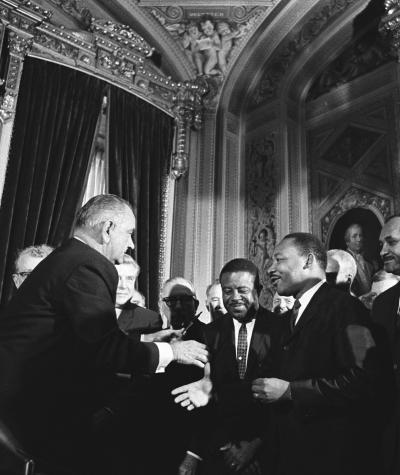June 25, 2020 marks the seventh anniversary of Shelby County v. Holder, a landmark civil rights case in which the United States Supreme Court gutted the Voting Rights Act (VRA) of 1965.
This decision halted decades of progress in the advancement of communities of color as it relates to access to the ballot box. Ever since, states and localities have reverted to discriminatory practices that restrict the voting rights of Black, Brown, Native, and Asian American people and put up unnecessary roadblocks to the ballot.
States have passed felony disenfranchisement laws, restrictive voter ID laws, and closed polling locations in predominantly Black and Brown communities, among other things.
Benefits of the VRA
For almost 50 years, the VRA protected the political voices of voters of color and ensured all voters could participate in the democratic system.
The VRA not only provided a private right of action so voters of color could sue to challenge discriminatory practices as they arose.
It also created a system of “preclearance” that forced jurisdictions with a history of repeated race discrimination to submit changes to their elections for review, thereby identifying discriminatory practices before they could be implemented and preventing disenfranchisement before it could occur.
Preclearance was a milestone achievement. It prevented states and localities that were proven bad actors from moving forward with new, creative ways to discriminate against and disenfranchise voters of color.
The VRA and its preclearance system is widely recognized as one of the most effective civil rights measures ever passed into law. It wasn’t controversial. It was reauthorized five times with overwhelming bipartisan support, most recently in 2006 by a vote of 390-33 in the House and 98-0 in the Senate. Sadly, today the political division in Washington tells a different story.
In December 2019, the U.S. House of Representatives passed a bill that would honor the legacy of the VRA and restore its main protections. However, it has gone nowhere in the U.S. Senate. Until they pass this bill, voters living in these jurisdictions – who have been subjected to ten or more discriminatory laws over the last two decades – will be left without protection and at risk of disenfranchisement.
Congress Must Ensure America is Prepared for November
During the primary season, we witnessed the profound effect of COVID-19 on our elections. Officials from Georgia to Wisconsin failed voters in those primary elections. This should serve as a wakeup call for our democracy.
Voters endured long lines and polling place closures, which complicated in-person voting. Other jurisdictions, like the District of Columbia, did not adequately prepare for a surge in mail-in voting and did not properly test systems for submitting absentee ballot requests, so the systems failed to work for some voters.
Policymakers have the responsibility to ensure that all eligible voters can vote and are not further disenfranchised in November. They must make changes to election laws and policies right now.
People should be able to exercise their constitutional right to vote and stay healthy, even during a pandemic. Voters should not have to choose between public health and a functioning democracy.
Seven years ago, the U.S. Supreme Court opened the door for elected officials to pass discriminatory laws that make voting harder for communities of color. When Congress considers the Health and Economic Recovery Omnibus Solutions (HEROES) Act, they should ensure that states have the funding they need so every voice is heard.
